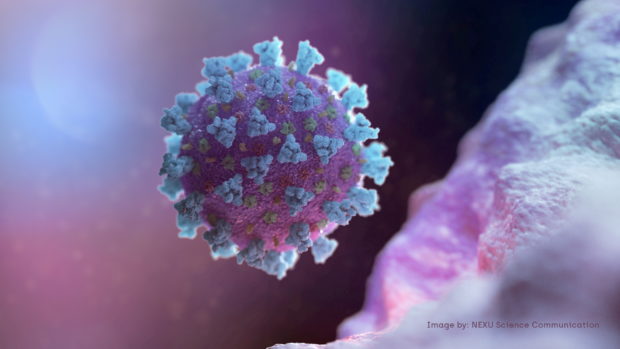
FILE PHOTO: A computer image created by Nexu Science Communication together with Trinity College in Dublin, shows a model structurally representative of a betacoronavirus which is the type of virus linked to COVID-19, shared with Reuters on February 18, 2020. NEXU Science Communication/via REUTERS
MANILA, Philippines — The government plans to move the Philippines to an endemic situation where individual Filipinos assume the bigger burden to take care of themselves against COVID-19 and be ready for any new pandemic.
National Economic and Development Authority (Neda) Undersecretary Rosemarie Edillon nonetheless said in a text message on Thursday that enabling conditions — on pandemic information and guidelines, as well as medical tools and facilities — will be provided by the government in the next national action plan (NAP) 5 currently being crafted for possible approval and pilot implementation by the Inter-Agency Task Force for the Management of Emerging Infectious Diseases (IATF) next month.
Edillon said the forthcoming NAP 5 against COVID-19 will also be about “achieving health care security.” The updated blueprint which guides the country’s COVID-19 response will be partly based on findings of a recent online survey conducted by the state planning agency Neda to define what was the “new normal” amid the prolonged pandemic.
During a forum organized by Go Negosyo on Thursday, Edillon said they were eyeing major changes from the current NAP 4, which measures infection management, vaccine rollout, as well as economic recovery, to NAP 5.
For instance, NAP 4 currently mandated the government to enforce physical distancing and face-mask wearing; for NAP 5, Neda was looking into passing the larger responsibility to individuals to, on their own, observe public health standards in order to protect not only themselves but also the people surrounding them, Edillon said.
At present, the government imposed strict hygiene and sanitation protocols, Edillon noted; moving forward, individual Filipinos will be enjoined to practice healthy lifestyles as well as active health-seeking behavior, she said.
The current alert levels — sporadic, granular lockdowns — being implemented locally whenever and wherever COVID-19 infections surged, will soon be changed into a mindset wherein individuals must be prepared to take on non-pharmaceutical interventions to counter any new pandemic which may happen in the future, Edillon said.
Also, the NAP 5 proposal would have to make individuals up-to-date and abreast of information about potential health risks and how they can protect themselves, Edillon added.
While prevailing COVID-19 prevention measures allowed more outdoor than indoor activities, households, businesses and government offices moving forward needed to ensure proper ventilation and environmental quality within their surroundings to keep the virus away, she said.
For its part, the government must remain on top of pandemic information-sharing and issuance of health guidelines; diagnosis, prevention, treatment of and vaccination against infectious diseases; provision of safety and environmental quality guidelines; addressing any long-term side effects of pandemics; ensuring businesses and services’ continuity; supplying personal protective equipment (PPEs); as well as social protection, especially among vulnerable sectors, the Neda official said.
As the Philippines emerged from the COVID-19 pandemic, Edillon urged more face-to-face classes among private schools, plus possible offering of remedial classes to make up for the poor quality of distance and online learning modes. Neda’s estimates last year had shown that one school year when students were unable to attend face-to-face classes would inflict P11 trillion in productivity losses across a 40-year period of a person’s working life span.
Edillon also suggested other “new normal” adjustments such as employers prioritizing to hire workers living nearby the workplace, and biking to move around.
RELATED STORY:
COVID-19 cases decline in 9 Metro Manila cities — OCTA

